Episcopal Church

As online worship becomes more common in some churches, leaders within the United Methodist Church are debating whether the denomination should condone online Communion.
About 30 denominational leaders met last week after Central United Methodist Church in Concord, N.C., announced plans to launch an online campus that potentially would offer online Communion. Some nondenominational churches already offer online Communion, according to United Methodist News Service, but leaders urged the denomination’s bishops to call for a moratorium on the practice and do further study of online ministries.
The majority of the leaders agreed with the statement that Communion “entails the actual tactile sharing of bread and wine in a service that involves people corporeally together in the same place.” Not everyone, however, agreed that congregants must be in the same place.
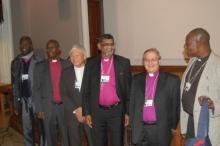
Primates and bishops from the Global South attending a gathering in Toronto, said current proposals for a new Anglican Communion covenant don’t go far enough to heal the conflict in the communion over homosexuality.
The Wednesday gathering to mark the 50th anniversary of the Toronto Anglican Congress, suggested the worldwide Anglican Communion faces troubled waters. Anglicans from the Global South prepare to meet for their second Global Anglican Future Conference next month and the Toronto meeting showed no signs of reconciliation.
Archbishop Ian Ernest, primate of the province of the Indian Ocean, said decisions by the Episcopal Church in the United States and the Anglican Church of Canada on issues involving homosexuality have torn the fabric of communion.
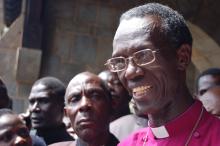
Concerned that the crisis in the worldwide Anglican Communion is deepening, conservative Anglican primates in Africa are organizing a second conference to discuss ways of returning the church to what they describe as biblical faithfulness.
The primates held the first conference in Jerusalem in 2008, five years after openly gay New Hampshire Bishop Gene Robinson was consecrated in the Episcopal Church. The action threw the communion into disarray.
At the Jerusalem meeting, the primates called for the creation of an Anglican province in North America to rival the Episcopal Church. Five years later, the primates say the new Anglican province, known as the Anglican Church in North America, is thriving.
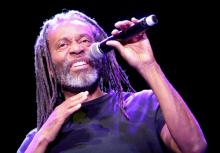
He’s best known for his iconic 1980s feel-good hit “Don’t Worry, Be Happy,” but Grammy-award winning artist Bobby McFerrin explores a deeper side of life in a new album.
Titled spirityouall, the recording includes his adaptations of traditional African-American spirituals and devotional songs that he composed.
McFerrin believes music has a transcendent spiritual power.
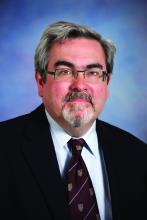
The Evangelical Lutheran Church in America has elected its first openly gay bishop, the Rev. R. Guy Erwin, to oversee churches in Southern California, four years after the church allowed openly gay men and lesbians to serve as clergy.
Following a wider trend within other mainline Protestant denominations to appoint gays and lesbians to leadership positions, the ELCA’s five-county Southwest California Synod elected Erwin on Friday (May 31) to a six-year term.
“It’s historic and a turning point, as was the ordination of women,” said Martin Marty, the dean of American church historians at the University of Chicago and a member of the ELCA. “This is just one of many indications that the culture has shifted.”

As I waited in the room heated to 105 degrees, my friend Molly looked for a sliver of floor space for her yoga mat. “I probably need a more relaxing type of yoga,” I whispered, almost apologizing for bringing my type-A body to the crowded Bikram class, known for its intense heat and addictive practitioners.
At exactly 10 a.m., the yoga teacher entered the room: I stood in unison with the other students, much like I rise for the procession at my church on Sundays. Surprisingly, much of what draws me to Bikram yoga also brings me back each week to the Episcopal church.
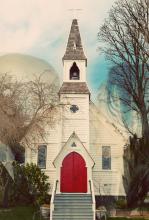
When disgruntled congregations have left hierarchical denominations such as the Episcopal Church, they’ve often lost property battles as civil courts ruled buildings and land are not theirs to keep.
But outcomes could be different this year, court watchers say, as high-profile cases involving dozens of Episcopal congregations in South Carolina and Texas wind their way through state courts. That prospect has observers watching for insights that could shape legal strategies in other states and denominations.
Both cases involve conservative dioceses that voted to leave the Episcopal Church over homosexuality, among other issues. In South Carolina, congregations representing about 22,000 people are suing the Episcopal Church for control of real estate worth some $500 million and rights to the diocese’s identity. In Texas, the national Episcopal Church is suing about 60 breakaway congregations in the Fort Worth area for properties estimated to be worth more than $100 million.
"I urge lawmakers to press for comprehensive and universal background checks for firearm ownership, regardless of where and how a gun is purchased; for bans on the availability to civilians of assault rifles and high-capacity magazines; and for policies designed to better regulate the manufacture of guns,” the Presiding Bishop states in her testimony. “The Episcopal Church also supports the highest level of accountability for violation of all existing laws pertaining to violence in our midst.”
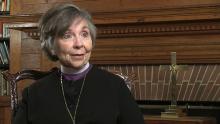
Bishop Jane Dixon, 75, died in her sleep on Christmas Day, according to the Episcopal Diocese of Washington. Dixon was the second woman consecrated as bishop in the Episcopal Church and the third in Anglican Communion.
A champion for justice and equality, Dixon was selected three times byWashingtonian magazine as one of the 100 most influential women in the Washington metropolitan area. In January 2002, she was named a Washingtonian of the Year.
From Mariann Edgar Budde, bishop of Washington:
Called to serve at a time when some refused to accept the authority of a woman bishop, Jane led with courage and conviction, and sometimes at great personal cost. She demonstrated that same bravery and grace when she brought hope and healing to our country by officiating at the National Day of Prayer and Remembrance service at Washington National Cathedral following the tragedy on 9/11.
Jane was a fighter for equality and social justice and this led her to speak at the White House against hate crimes and to stand for inclusiveness within the Episcopal Church.
'Jane is a person who has the courage of her convictions but the grace and humility to know that none of us can equate our ways with God's ways, our thoughts with God's thoughts,' said the late Verna Dozier, Jane’s longtime mentor, in the sermon she preached at Jane’s consecration.
Dixon is survived by her husband of 52 years, David McFarland Dixon, Sr., her three children, and six grandchildren.
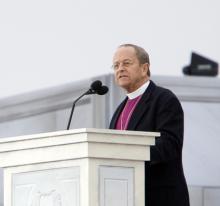
CONCORD, N.H. -- When V. Gene Robinson became the first openly gay bishop in the Episcopal Church in 2003, his controversial election triggered shock waves and fears of schism across the worldwide Anglican Communion. Hundreds of parishes left the Episcopal Church in protest.
Now, as this lighting-rod figure prepares to retire on Jan. 5, he’s leaving New Hampshire for a city that knows polarization all too well: Washington, D.C.
But rather than throw fuel on the culture wars, Robinson foresees a new role as a bridge builder for a nation strained by divisive issues. First up: helping his new church home, St. Thomas’ Parish in Dupont Circle, found a Center for Non-Violent Communication.
“Our big goal is to change the nature of the debate in Washington,” Robinson said during an interview at his Concord office. “We’re mostly shouting at each other these days. We’d like (the center) to become a place where people can learn about and commit themselves to a different kind of tone.”
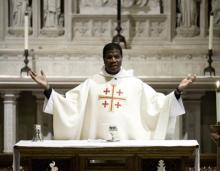
Conservative commentators like Rupert Murdoch's stable and Ross Douthat of The New York Times are feasting on what they perceive as the "death" of "liberal Christianity."
They add two and two and get eight. They see decisions they don't like — such as the Episcopal Church's recent endorsement of a rite for blessing same-sex unions. They see declines in church membership. They pounce.
Such "liberal" decisions are destroying the church, they say, and alienating young adults they must reach in order to survive.
Never mind that surveys of young adults in America show attitudes toward sexuality that are far more liberal than those of older generations. Never mind that conservative denominations are also in decline.
Never mind — the most inconvenient truth — that mainline denominations began to decline in 1965, not because of liberal theology, but because the world around them changed and they refused to change with it.
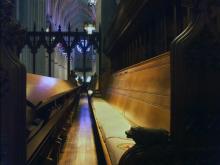
The most amazing thing happened this week.
Maybe you missed it.
The Episcopal Church held their General Convention in Indianapolis, Indiana. They gathered. They prayed. They sang. I'm told there were a few sermons, too! And you know they offered the Eucharist. They can't do anything without someone bringing bread, wine, and a blessing. God love 'em.
This week they voted, too. They held up in their bicameral way of doing things and worked out some key issues. Among the issues at hand were whether or not to sell their offices in New York City and to find ways of investing their income in the future of the denomination. They did both. If you followed them on Twitter (Many did. #GC77 trended right up there!), then you know that there was hope and joy in their rooms. This is not why they made the news, of course. They made the news when they voted to formally allow for same-sex blessings within their communion.
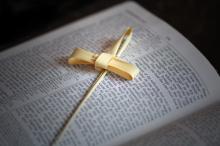
The Bible is steeped in drama. Consider Jesus’ bold reading of Isaiah in the synagogue (Lk. 4:18-19), or Solomon’s liturgy climaxing in the LORD’s glory filling the temple (1 Ki. 8). Paul may have directed a performance of Jesus’ death: “It was before your eyes that Jesus Christ was publicly exhibited as crucified!” (Gal. 3:1c). Dramatic structure serves to sharpen our focus and draws us into narrative as imagined and experienced co-conspirators.
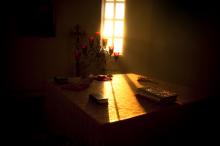
A Virginia judge has ordered seven congregations that broke from the Episcopal Church to return all property to the local diocese — from valuable land to sacred chalices — by April 30.
The Diocese of Virginia had wanted the properties returned by March 30, a week before Easter. But Fairfax County Circuit Court Judge Randy Bellows agreed to give the breakaway congregations more time.
In a closely watched case that reached the Virginia Supreme Court, Bellows ruled in January that congregations had the right to leave the Diocese of Virginia, but not to take church property with them.

Five years ago, the Rev. Teresa K.M. Danieley had an epiphany of sorts. If people can grab breakfast on the go or pay a bill from their cell phone, she thought, why shouldn't they be able to get their ashes in a flash?
That's why, on Ash Wednesday 2007, Danieley planted herself in full priestly regalia at a busy intersection in St. Louis, smudging the sign of the cross on the foreheads of bicyclists, drivers and bus passengers.
This year, at least 49 Episcopal parishes across 12 states will offer ashes to passersby at train stations, bus stops and college campuses on Ash Wednesday (Feb. 22) as Danieley's "Ashes to Go" concept spreads nationwide.
U.S. Bishops Should Focus On Economy, On Deficit Reduction; The Public Has Spoken: Tax Hikes On Rich, No Cuts To Medicare; My Foreign Aid Budget Starts At Zero; John McCain 'Very Disappointed' By GOP Candidates' Endorsement Of Waterboarding; Keystone XL: Despite Delay, Oil's Grip Remains Strong; Latino Evangelicals Challenge Alabama Brethren On Immigration; Mariann Budde, Diocese Of Washington’s Next Top Bishop, Has Plans For Reviving The Episcopal Church.
The Dream is Freedom: Pauli Murray and American Democratic Faith, by Sarah Azaransky.